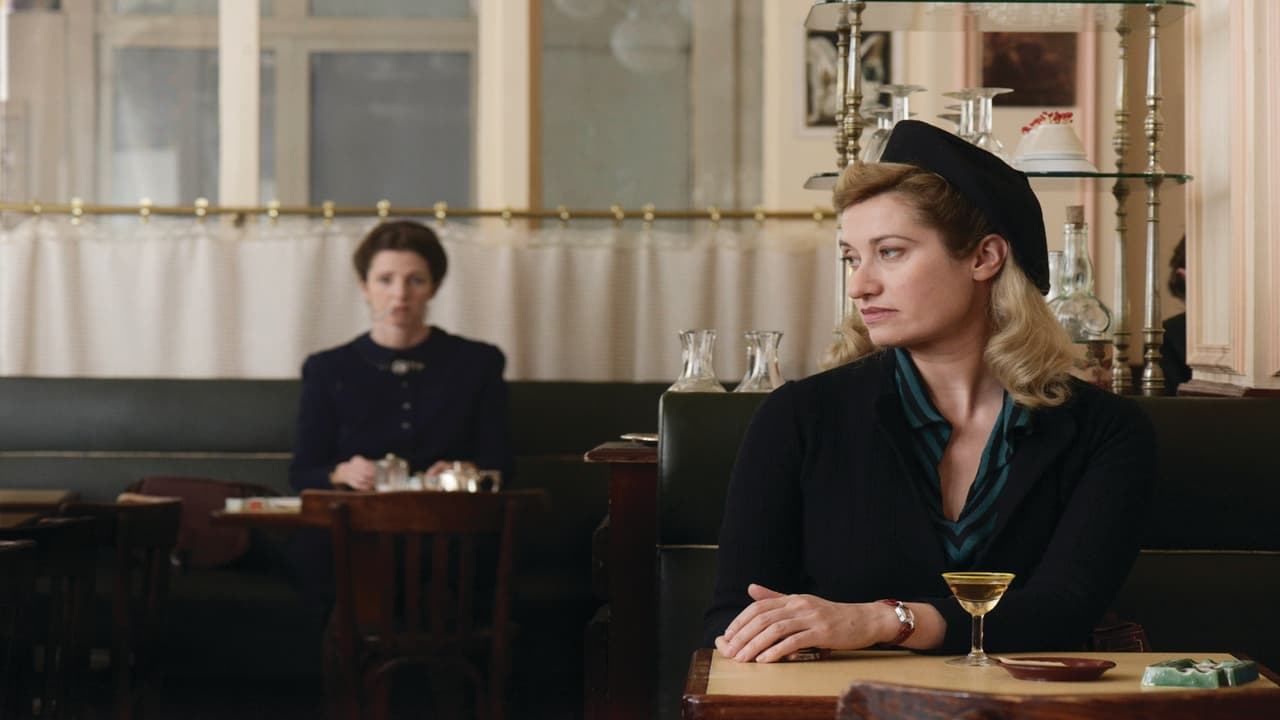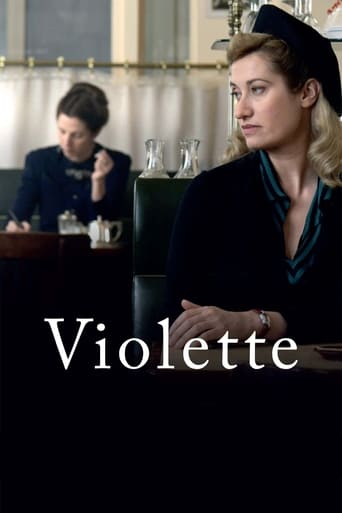



That was an excellent one.
I think this is a new genre that they're all sort of working their way through it and haven't got all the kinks worked out yet but it's a genre that works for me.
View MoreIt really made me laugh, but for some moments I was tearing up because I could relate so much.
View MoreThe movie really just wants to entertain people.
Violette (2013)Violette Leduc was a French novelist who approached female sensual and sexual subjects, including lesbian affairs, with fresh and original directness. This is one story of her life. portrayed as largely tormented and often filled with a sense of hopelessness. Her writing and her love life was constantly ravaged.But this all happens in beautiful France, so the movie is a gorgeous meandering journey through the 20th Century in pastel, gloomy, golden, timeless countryside. And in the end, for those who care about the real woman, she overcomes. Her death to breast cancer (not in the movie) is just the sad inevitable darkness that seemed to follow her even during the brightness of a great and daring mind.There is no strong narrative propulsion here, for sure. To like this you'll have to enjoy lingering, and sometime in zones of brown melancholy. I did like that, and liked all of the movie, even if I found myself physically restless, too. I can't see how it could have been done differently, but it's good to have poetic patience (or patience for poetry). The acting, it must be emphasized, is vivid and raw in a modernist way not far from the many bits of text taken from Leduc's writing. Emmanuelle Davos makes no compromise in her showing both the deeply unhappy and the hopeful sides of this woman. And Sandrine Kaberlain is a severe and knowing Simone de Beauvoir, the famous author who comes again and again to Leduc's aid. The implied love affair, fractured and incomplete, between these two is an important if somewhat thinly sketched part of the larger picture for the title character.This is all moving, great stuff. There is an echo (or a harbinger) of another pair of women drawn with artistry and love in a recent movie, "Reaching for the Moon" (which I liked a lot). But such a different ambiance here, all dank and fearful with shafts of sunlight only sometimes felt. I recommend them both, but this one will require slowing down and appreciating the mood as much as the details of this intense, ordinary biography.
View MoreMartin Provost's new film 'Violette' charts the professional life of French writer Violette Leduc (Emmanuelle Devos), who rose to fame in the middle of the 20th century.Leduc caught the attention of publisher Simone de Beauvoir (Sandrine Kiberlain), who published her story. But this was just the beginning of Leduc's long struggle for success, acceptance, and most of all friendship and companionship. She's not an easy person to like, constantly berating herself over her appearance, her writing, and questioning her motives for staying alive. Unwanted as a child, Leduc's insecurity and destructiveness is laid bare for all to see in a time when women had few rights. Her writing is raw, exploring subjects such as abortion and sexuality in ways previously unheard of in French society.Simone de Beauvoir keeps encouraging Leduc to right all her wrongs through writing, and their relationship is the anchor for this film. She introduces her to a distinguished group of intellectuals which include Camus, Sartre, Genet, and the rich benefactor Jacques Guerin (Olivier Gourmet). But regardless of her associations, Leduc eventually shuns them all. De Beauvoir is the only relationship Leduc has managed to sustain, but its ultimately a relationship of intimate rejections.Devos and Kiberlain excel as this most unlikely of pairings. As much as this film is about their relationship, ultimately it is about the torment in Leduc from repeated abuse and rejection. It was through her writing that Leduc finally understood life, where her preoccupation of the perception of others of herself eventually diminishing, replaced by her observations of them and channelled through her writing.
View MoreAs a student of irony it pleases me to imagine the two leading actresses - both beautiful in real life - competing on screen to see who could come across as the most plain of the two. They had no need to compete for acting honours for both are among the finest that French cinema has to offer and here both are at the the top of their considerable collective game. The director clearly has a penchant for bio-pics for it isn't all that long ago that he gave us Seraphine in which he coaxed yet another top-of-the-line performance from Yolande Moreau. Equally ironic is that supporting actor Olivier Gourmet, who has always had a strong facial resemblance to Eric Morecombe, does so more than ever, reminding English viewers of a beloved - and brilliant - English comedian in an exceptionally downbeat and sombre film. Though it's well over two hours of largely unrelieved doom and gloom it remains a superb portrait of two fine French writers in mid life. Highly recommended.
View MoreFrench actor, screenwriter and director Martin Provost's fifth feature film which he co-wrote with screenwriters Marc Abdelnour and René de Ceccaty, is inspired by the life of a French 20th century author. It premiered in the Special Presentations section at the 38th Toronto International Film Festival in 2013, was shot on locations in France and is a France-Belgium co-production which was produced by producers Miléna Poylo and Gilles Sacuto. It tells the story about a daughter and sister named Violette Leduc who was born in the late 1900s in Arras in the commune of Pas-de-Calais in Northern France, at that time derogatorily called a bastard, who lived with her mother named Berthe and grandmother named Fidéline, met a man named Ernest Dehous in 1913 and who had begun her initial education at collége Valenciennes when the First World War started. Distinctly and subtly directed by French filmmaker Martin Provost, this quietly paced and fictionalized reconstruction of real events which is narrated mostly from the main character's point of view, draws a heartrendingly humane portrayal of a French citizen whom in the early 1940s during the Second World War in Normandie, France, met a Jewish Roman Catholic writer named Maurice Sachs, as a 33-three-year-old wrote for the first edition of the magazine Pour Elle and the daily newspaper Paris-Soir and who after the liberation of France was introduced to a French novelist and playwright named Jean Genet and a French perfumer and collector named Jacques Guérin. While notable for its versatile and atmospheric milieu depictions, reverent cinematography by cinematographer Yves Cape, production design by production designer Thierry François and costume design by costume designer Madeline Fontaine, this character-driven and narrative-driven story about significant people in the history of French culture and a memorable person who got her first novel called "In the Prison of her Skin" published in 1946, depicts an internal study of character. This densely historic, at times humorous and conversational reminiscence which is set in France in the 20th century and where a boarding school student and alumni at Lycée Racine in Paris, France who in the mid-1960s met a French author named Françoise d'Eubonne and whose life was marred by the ... of being born, starts an invaluable friendship with a French 20th century thinker who was writing a book and who encourages her to go on writing and use her personal experiences, is impelled and reinforced by its cogent narrative structure, substantial character development, subtle continuity, use of music, comment by Madame Simone Ernestine Lucie Marie Bertrand de Beauvoir: "The way you see yourself has changed." and the majestic acting performances by French actresses Emmanuelle Devos and Sandrine Kiberlain. A reflectively biographical, eloquently literary and lyrically cinematographic narrative feature.
View More